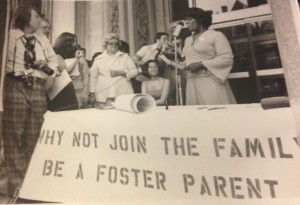FAFS’ surviving founders remember co-founder Hattie Talley as vibrant and committed.
 First and foremost, Hattie Talley was the right person at the right time. Not only was she a very caring individual, but she was also an outstanding advocate for foster parents.
First and foremost, Hattie Talley was the right person at the right time. Not only was she a very caring individual, but she was also an outstanding advocate for foster parents.
Hattie’s strength was her understanding of the importance of collaboration and partnerships.
She formed successful working relationships with DYFS (now DCP&P), the National Foster Parent Association (NFPA) and others.
She was instrumental in having DCP&P assign a Liaison to the New Jersey Foster Parents Association (NJFPA). That was our name before we became Foster and Adoptive Family Services, or FAFS. The Liaison attended our monthly Board meetings along with our State Officers and County Association Presidents. The Liaison would then bring the foster parents’ concerns and questions back to the DCP&P Director for a response or action.
By promoting the importance of collaboration and partnerships, Hattie Talley secured funding for our state foster parent representatives to attend national foster parent conferences. As a result, several state representatives served as Committee Chairs for the NFPA. That put the us in a good position to submit a successful bid to host the NFPA Conference in New Jersey.
Before hotels prohibited food from the outside being brought in, we had a “Hospitality Room” that was available to NJ representatives and others at the National Conferences. This led to a lot of interaction with foster parents and agency staff all across the US. As a result, ours was viewed as a progressive and well run organization.
Hattie Talley’s outgoing personality helped her secure donated space for our statewide meetings, where everyone would bring food and refreshments. While much work was accomplished, the support and encouragement received from networking with each other was invaluable to all the foster parents in attendance. Hattie always had a great sense of humor. It kept everyone going during the dark times.
Because she was so adept at partnering with others for the sake of foster families, Hattie Talley was the first foster parent to serve on the DCP&P Board of Trustees. Her leadership and organizational skills laid the foundation for many future accomplishments, including but not limited to:
- FAFS becoming the first state association to be funded for recruitment, training and support
- Invitations from other states to speak to agencies and legislatures on our partnerships and ability to support foster parents
- Monthly coordinating meetings, between DCP&P County/Local Office Managers and FAFS’ Board of Directors
- FAFS’ recognition by the NJ Governor and NJ Legislature as the “go to” organization for information about foster care, and invitations to testify at Legislative Hearings
Without the good humor and commitment of Hattie Talley, FAFS would not be where it is today: one of the premiere foster care organizations in America celebrating forty years of service to foster families in New Jersey.

 What started off as a partnership between three foster parents grew into a statewide group of foster care advocates.
What started off as a partnership between three foster parents grew into a statewide group of foster care advocates. I got involved in FAFS’ support groups for foster parents in New Jersey very early on. When I began fostering, I received a call from Carol, Ed Ciak’s (FAFS Board Member) wife. At the time, the Division had asked her to contact all new foster parents when they received their first placement. She asked how things were going, asked if I had received the paperwork I needed (Medicaid card, foster parent ID letter, initial clothing allowance, etc.) and then invited me to a New Jersey Foster Parent Association (now Foster and Adoptive Family Services, or FAFS) meeting.
I got involved in FAFS’ support groups for foster parents in New Jersey very early on. When I began fostering, I received a call from Carol, Ed Ciak’s (FAFS Board Member) wife. At the time, the Division had asked her to contact all new foster parents when they received their first placement. She asked how things were going, asked if I had received the paperwork I needed (Medicaid card, foster parent ID letter, initial clothing allowance, etc.) and then invited me to a New Jersey Foster Parent Association (now Foster and Adoptive Family Services, or FAFS) meeting. The idea of what the relationship between foster children and foster parents should be evolved during this crucial time in foster care system history. Bonding between foster parents and foster children was beginning to be encouraged, rather than discouraged. In some cases, this led to fewer moves for children in foster care and greater stability.
The idea of what the relationship between foster children and foster parents should be evolved during this crucial time in foster care system history. Bonding between foster parents and foster children was beginning to be encouraged, rather than discouraged. In some cases, this led to fewer moves for children in foster care and greater stability.